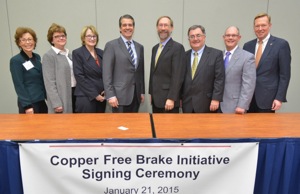WASHINGTON, D.C. – As previously announced, representatives of the U.S. Environmental Protection Agency (EPA), the Environmental Council of the States (ECOS) and motor vehicle industry associations signed a Memorandum of Understanding (MOU) between the agency and the motor vehicle industry for the reduction of copper in brake pads. The MOU calls for the reduction of the use of copper in brake pads beginning in 2021 to levels less than 5 percent by weight and further reductions to 0.5 percent by the year 2025.
The states of California and Washington initially enacted legislation to this effect. Proponents of the measure say it became clear that guidelines were needed at the national level to ensure consistency in reporting requirements and recognition of the industry’s compliance with those laws. Brake manufacturers have fully supported the efforts and have expended millions of dollars in the reformulation of their proprietary brake friction ingredients to ensure continued product quality and performance, motorists’ safety and reduced copper content.
A signing ceremony was Jan. 21 in Washington, D.C., in conjunction with the Society of Automotive Engineers International (SAE) 2015 Government/Industry Meeting. Participating in the MOU signing were Stan Meiburg, acting deputy assistant administrator of the EPA, signing for EPA Administrator Gina McCarthy; Robert J. Martineau Jr., ECOS president and commissioner of the Tennessee Department of Environment & Conservation; and designated signatories from the supporting industry trade associations.
“EPA is proud to partner with the automotive industry and the states to reduce the use of copper in motor vehicle brake pads, which means less of this material running off our roads and into our nation’s waterways,” said Meiburg. “The environment and public health in our country will benefit from this type of collaboration between the public and private sector.”
“ECOS is proud to be part of an agreement that will make a meaningful contribution to improved water quality across the nation,” said Martineau. “This effort shows how states, the federal government, and industries can work together to develop innovative, non-regulatory ways to reduce pollution.”
“This historic MOU will provide the motor vehicle industry with consistent copper reduction guidelines and eliminate the potential for disparate state regulations,” said Steve Handschuh, president and CEO of the Motor & Equipment Manufacturers Association (MEMA), one of the key industry associations involved with the effort. “This has been a proactive, collaborative effort by regulatory agencies, states, the automotive aftermarket and the motor vehicle industry to reduce copper in U.S. waterways.”
The motor vehicle industry associations that supported this effort and provided feedback on the MOU are:
* Alliance of Automobile Manufacturers
* Association of Global Automakers
* Auto Care Association
* Automotive Aftermarket Suppliers Association
* Brake Manufacturers Council
* Heavy Duty Manufacturers Association
* Motor & Equipment Manufacturers Association
* Truck and Engine Manufacturers Association
To learn more about the MOU and copper reduction in brake products, visit www.copperfreebrakes.org.





